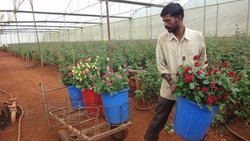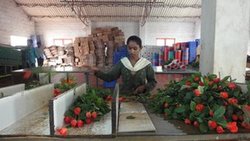
Rose farm in Doddaballapur. Karuturi Global produces over 550 million stems of cut roses annually and wants to open factories in Ethiopia
Indian firms look to Africa for business opportunities
By Shilpa Kannan BBC News, Bangalore
"My ambition is to develop these 300,000 hectares and go past to a million hectares," says Sai Ramakrishna Karuturi pointing to a map of Africa in his office in Bangalore in southern India.
Ambitious as its sounds, Karuturi Global is now one of the biggest private land owners in the world.
They have invested over a quarter of a billion dollars in Ethiopia and Kenya alone.
Over 300,000 hectares in Gambela, Ethiopia, have already been leased and they want to start large scale commercial agriculture there.
Apart from Ethiopia, the company is looking at developing large farm tracts as agro-economic zones in Sierra Leone, Senegal, Tanzania and Mozambique.
Its race to get ahead in Africa began in a small rose farm in Doddaballapur, near Bangalore in southern India.
Under the protective cover of green houses, are rows of sweet smelling roses in pale yellows, bright oranges and pinks.
Cutting the long stems with precision are workers who gather the flowers in buckets and send it to be processed.
These roses command a premium in markets as far as Holland.
This is just one of the many farms of Karuturi Global which produces more than 550 million stems of cut roses annually.
Indian companies are unable to expand into large scale commercial farming due to the strict laws and restrictions on the size of land holdings at home.
So Africa offers an untapped market with vast tracts of land that is cheap and more importantly easily available.
Sai Ramakrishna Karuturi says that they are modelling their farms on the Latin American model of commercial farming which has been successfully implanted in Brazil and Argentina.
"We are using knowledge and resources from Latin America and North America, capital from this part of the world (India) and land from Africa to make hopefully a heady cocktail," he adds.
Rich mineral wealth
With 60% of the world's uncultivated land, agriculture in the Africa is lucrative.
But the top draw for countries has been the rich resources in Africa.
"India is predicted to grow at over 8% and to fuel that kind of fast growth, you need resources," says Anushuya Gounden, head of Africa at Deloitte.
Africa is home currently to 10% of the world's oil reserves, 40% of gold, 80 to 90% of chrome and platinum metal groups.
"The interesting thing is that those are the known resources," he adds.
"But the unknown and the untapped are significantly higher than those."
The sharp rise in commodity prices over the past decade has out the focus firmly on Africa.
While Europe still dominates trade, emerging markets are increasingly trying to get a foothold there.
India is keen to build its presence but the main competitor is China.
Many state-owned enterprises from China have been leading their capital intensive forays in mining while India's trade with Africa has been driven largely by the private sector.
Not just resources
But there is more to Africa than just commodities.
In 2008, McKinsey reported that Africa's collective GDP was $1.6tn (£1.01tn; 1.19tn euro) which is roughly equal to that of Brazil or Russia.
Increasingly, as the middle classes are getting wealthier and spending more money, it is also being looked at as a consumer market.
Since 2005, Indian companies have acquired or invested in at least 79 companies in Africa.
One of them is Bharti Airtel which paid $9bn for the African telecom operations of Kuwait-headquartered Zain in 2010.
Like India, Africa too is a fast-growing mobile telecom market in the world. Seven out of 10 phones in Africa are mobile.

Cut roses are packed off to Russia, Europe, Middle East and North America. Indian firms face competition from state-owned Chinese companies as they try to expand in Africa
"We can certainly match China dollar for dollar and certainly skill for skill."
Other firms such as Tata Motors, Dabur, Marico, Essar Group and Godrej are also all investing in Africa.
India's bilateral trade with Africa crossed the $50bn mark last year and it is the second largest foreign investor in Ethiopia.
It is also one of the top 10 trading partners of South Africa which has been traditionally the top destination for investment.
But increasingly companies are looking at other countries like Sudan - where there are more than 30 domestic companies working in steel, tiles, and perfumes and plastics.
Many businessmen in India believe that Africa is on the threshold of a big boom and see similarities there with what India was 30 years ago.
Historic links
Trade between India and the African continent is not new.
There was a booming trade between India and Africa historically through the Arab traders.
During the colonial times, the British government sent a lot of Indians to work in the mines, fields, railway projects in Africa.
That is how the Indian diasporas spread in the African continent.
Some experts feel that the trade history that India shares with Africa may be one of its challenges.
The other challenge would be to tap into its very large diaspora particularly in East and Southern Africa to enable business.
Trade today, however, has been reinforced by two things and are both economic.
"One is the growth story of India and second is that Africa has become very resurgent in the last 10 years," says HHS Viswanathan who represented India in the African Development Bank.
"If you talk of sub-Saharan African it is a success story - both politically and economically."
"Famine, poverty and under-development still exist in many parts. But of you see the continent as a whole, it is a success story," he adds.
Back at the Karuturi farms, gherkins are being packed off as pickles to Russia, Europe, Middle East and North America.
If its East Africa operations take off the way it hopes, it plans to open factories like these in Ethiopia.
From growing vegetables to processing it and exporting it, the company wants to complete the cycle.
With growing consumer spending, Africa has an attractive consumer base.
For companies here, it's an opportunity to replicate the profitable but low-cost model that they have perfected in India.












